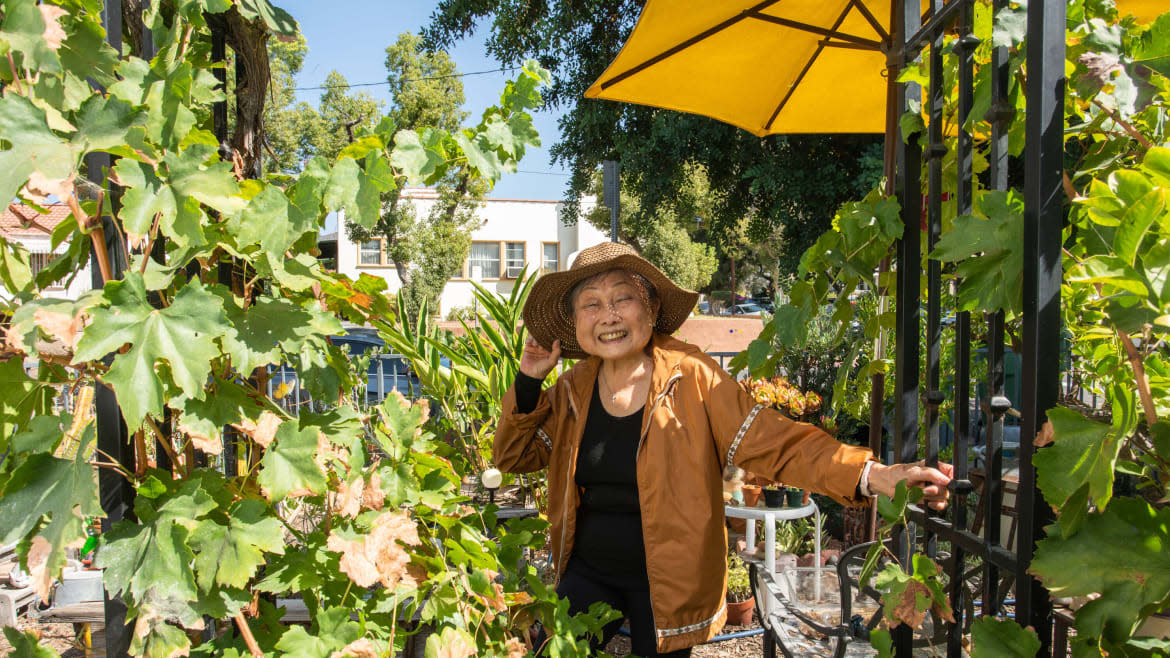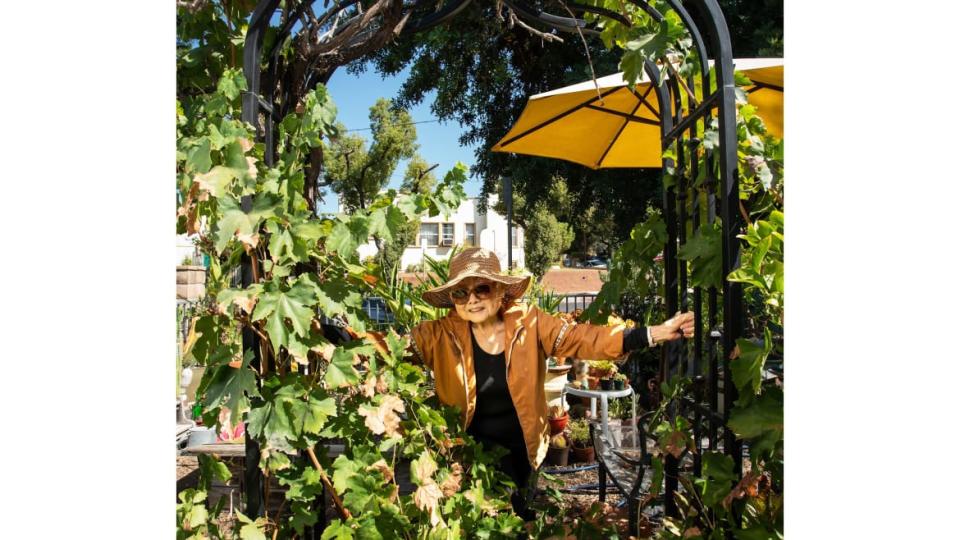Want to Live to 100? Learn Some Lessons From SuperAgers

- Oops!Something went wrong.Please try again later.
HIGHLAND PARK, California—Frances Ito is a typical artistic Angeleno. Her packed schedule includes a weekly jam session with other musicians, film classes, and shoots. In between is spirituality, volunteering, and downtime for gardening.
The fact that she just happens to be in her nineties almost seems incidental to Ito’s story—living proof that, as the song goes, age ain’t nothing but a number.
“Longevity is not a handicap,” Ito told The Daily Beast on her 91st birthday. “But some people treat it that way.”
Scientists consider Ito to be a “SuperAger,” a person with an exceptionally long life remarkable for its continued activity. Gerontology, the study of old age and aging, is full of papers about what makes people age gracefully from genetics, to medicine, to diet—but a SuperAgers program at the University of Southern California is less focused on who these people are, and more on what they do.
To put it another way: It’s not so much Ito’s health that helps her to keep busy and moving, but that her active lifestyle keeps her healthy.

Frances Ito, 91, lives an active lifestyle that includes film classes, volunteering, and gardening.
Jennifer Ailshire, an associate professor at USC’s Leonard Davis School of Gerontology, pointed out there hasn’t been much looking at aging from the perspective of social and interpersonal dynamics. “Most of the research has been focused on … things that maybe are not so much in our control,” Ailshire told The Daily Beast. “This project, though, is asking, what are the other factors?”
Ito’s parents died in their 70s and her brother at 47 due to heart disease, so there’s no history in her immediate family of long life. Ito has also battled her own cardiac issues. But, she hasn’t changed her eating habits much over time, aside from a few years of avoiding meat, dairy, and eggs, and carries only 100 pounds on her 4-foot-9 frame.
“I know I’m different from most people,” she said.
The latest data from the Centers for Disease Control says the average American’s life expectancy is 76.4 years. But if USC’s Lifetime Circumstances Predicting Exceptional Longevity Project does its job and raises that number, it also brings up interesting questions about just what is “normal aging,” according to Ailshire.
“Maybe it’s more like ‘typical’ or ‘majority’ aging,” Ailshire said. “We are seeing with this group of [SuperAgers] that they're quite extraordinary. They really diverge from adults who don't make it to those old ages.”
She adds, “They just look healthier all throughout their lives.”
Being a SuperAger is not as simple as reaching a certain birthday. Rather, it’s more of a you-know-it-when-you-see-it situation or “a state of mind,” as Ailshire called it. It’s the 96-year-old sculptor who recently had work exhibited in Los Angeles, or famed television producer Norman Lear, still racking up executive producer credits in the months before his 100th birthday.
Health issues late in life don’t disqualify one from Super Ager status either. For example, Ito said she nearly lost a leg to circulation problems.
To that end, it’s difficult to pin down just how many SuperAgers there are. As a crude proxy, the United Nations’ worldwide estimate of centenarians tallied 451,000 in 2015, nearly five times as many than in 1990. It’s projected to boom to 3.7 million by 2050.
Not only are their absolute numbers increasing, but those with triple-digit orbits around the sun are a growing percentage of the elderly population: In 1990, there were 2.9 centenarians for every 10,000 adults ages 65 and older around the world; that share grew to 7.4 by 2015 and is projected to rise to 23.6 by 2050.
The statistical work by the Longevity Project’s team will expand upon previous studies by Ailshire and others. One paper looked at whether longer lives are healthier lives, concluding that some centenarians and near-centenarians achieve exceptional longevity in relatively good health and without loss of functioning.
This May Be Our Best Chance to Find the Secret to Longevity
Another study found that the oldest are more satisfied with life, can better maintain social relationships with family and friends, and receive more social support than younger older adults.
When Ailshire speaks with SuperAgers, she’s struck by how few credit their prolonged golden years to simply being born to long-lived parents. “They always cite some other thing that they did since they were young,” she said. “Or they'll say, I just was always active, I was always involved. So, the things that SuperAgers themselves will cite are not the things scientists typically study.”
The durability of SuperAgers received a real-world test during these recent COVID years. When the pandemic first erupted, the immediate lockdown of society raised concern in Ailshire that the elderly most dependent on personal interactions would suffer for suddenly having been cut off from the outside world.
“At the same time,” Ailshire said, “I think they were probably better, more industrious at finding ways to cope with that kind of isolation that was enforced upon us, or was sort of self-enforced during the pandemic.”

Ito stays active in her community through volunteering, which might help her own mental and physical well-being as well as others.
For one, Ailshire noted the SuperAgers embraced technology—which flies in the face of the stereotype of the senior befuddled by modern wonders such as a modem and router—so they could Zoom and FaceTime with family and friends.
(Ito said she had many vacations canceled, and online gatherings of ukulele enthusiasts like herself only went so far—so she instead plowed through 20 books.)
Nevertheless, SuperAgers’ survival during the pandemic isn’t all about adaptation in the absence of socialization.
“They also must have some fundamental underlying biological advantage,” Ailshire said. “An advantage that gets you to age 80 to 90 to 100 will also help you with a virus, like COVID in any of its variants, because it probably does suggest that you have better functioning across all body systems, including immune functioning and some of the other systems that we think COVID targets as well.”
“I imagine that they probably are less likely to get covid, less likely to get sick, less likely to get hospitalized, and less likely to die,” she added.
Glow-in-the-Dark Worms Could Reveal Secrets to Regeneration and Longevity
Another benefit of learning how some people age but don’t “grow old” is that it raises our chances for a dignified death. Ailshire described a hypothetical graph of a SuperAger’s long years lived plotted against their good health: it would look like the corner of a rectangle, with the person enjoying an extended period of senior wellbeing before a quick, clean end.
The alternative is a slow deterioration from alive to dead, with accompanying medical issues all the way until expiration.
“That's not ideal. I don't think any of us really want that,” Ailshire said. “We all just want to, you know, pop off in our sleep one night.”
As Ito discusses what she’s been up to in her old age, it sounds like enough to wear out a much younger person. She travels a lot, with many trips being the subjects of short films Ito produced and later showed at last year’s Los Angeles Asian Pacific Film Festival in the program “Fran Rockstar!” Then there’s the volunteering: for the Los Angeles Conservancy, the Audubon Society, at her church.
What Ito doesn’t make time for is sedentary, passive activities. “Watching TV is horrible,” she said.
With the numbers of SuperAgers on the rise, Ailshire believes it would be a waste for the rest of us not to ask these people to pass on their knowledge and wisdom.
“We should be providing them opportunities to stay plugged in with the social fabric that they help to contribute to,” Ailshire said. “These people can be really incredible resources for communities through some of these volunteer efforts—and we see some of that happening around the United States, with lots of volunteer opportunities the older adults are taking advantage of.”
But just as volunteering can improve the world around them, there is a potential reciprocal benefit: Volunteering can keep SuperAgers feeling… well, super.
Ito certainly believes that.
“Make the time to do it,” Ito advises other seniors. “It not only helps the community and the people that you're involved with, but it really helps you as an individual—physically, mentally.”
Got a tip? Send it to The Daily Beast here
Get the Daily Beast's biggest scoops and scandals delivered right to your inbox. Sign up now.
Stay informed and gain unlimited access to the Daily Beast's unmatched reporting. Subscribe now.

